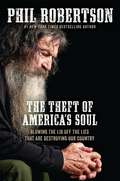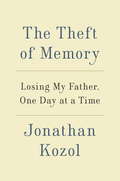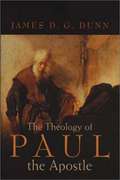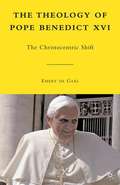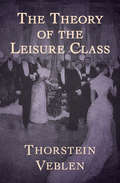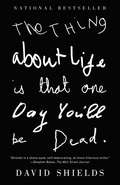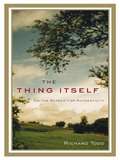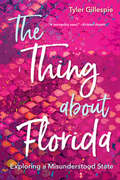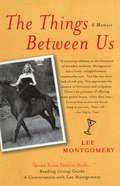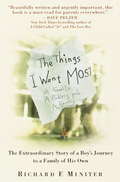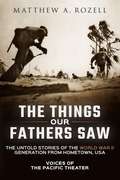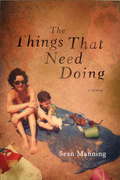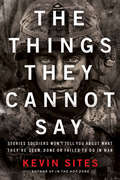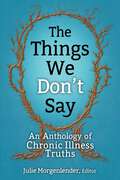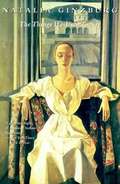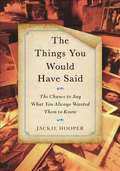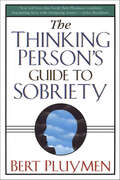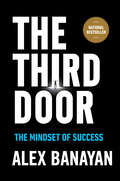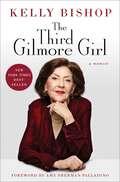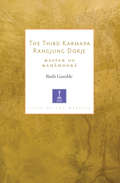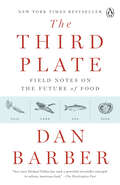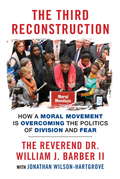- Table View
- List View
The Theft of America’s Soul: Blowing the Lid Off the Lies That Are Destroying Our Country
by Phil RobertsonIt’s time to take back what the devil has stolen and put God back into our culture.Phil Robertson, patriarch of A&E’s Duck Dynasty and one of the most recognized voices of conservative Christianity in America, believes that little by little, generation by generation, America has allowed the lines of morality, decency, and virtue to be erased. Our values have disappeared as we began to believe lies—such as that God is dead, truth is relative, and unity is impossible—that have brought discord, division and protest. But Phil also believes that things can change.Writing with captivating storytelling and unflinching honesty, Phil shows how to make America a God-honoring nation once more: by dropping the ten central lies that rule our day and taking up the ten truths that will bring peace of mind, harmony, and prosperity back to our country. The Theft of America’s Soul is a prophetic wake-up call for all who desire to see our nation thrive. And it is also an invitation to experience the life-giving, peace-filling, wholly-transforming love of God.
The Theft of Memory
by Jonathan KozolNational Book Award winner Jonathan Kozol is best known for his fifty years of work among our nation's poorest and most vulnerable children. Now, in the most personal book of his career, he tells the story of his father's life and work as a nationally noted specialist in disorders of the brain and his astonishing ability, at the onset of Alzheimer's disease, to explain the causes of his sickness and then to narrate, step-by-step, his slow descent into dementia. Dr. Harry Kozol was born in Boston in 1906. Classically trained at Harvard and Johns Hopkins, he was an unusually intuitive clinician with a special gift for diagnosing interwoven elements of neurological and psychiatric illnesses in highly complicated and creative people. "One of the most intense relationships of his career," his son recalls, "was with Eugene O'Neill, who moved to Boston in the last years of his life so my father could examine him and talk with him almost every day." At a later stage in his career, he evaluated criminal defendants including Patricia Hearst and the Boston Strangler, Albert H. DeSalvo, who described to him in detail what was going through his mind while he was killing thirteen women. But The Theft of Memory is not primarily about a doctor's public life. The heart of the book lies in the bond between a father and his son and the ways that bond intensified even as Harry's verbal skills and cogency progressively abandoned him. "Somehow," the author says, "all those hours that we spent trying to fathom something that he wanted to express, or summon up a vivid piece of seemingly lost memory that still brought a smile to his eyes, left me with a deeper sense of intimate connection with my father than I'd ever felt before." Lyrical and stirring, The Theft of Memory is at once a tender tribute to a father from his son and a richly colored portrait of a devoted doctor who lived more than a century.From the Hardcover edition.
The Theft of Memory: Losing My Father, One Day at a Time
by Jonathan KozolNational Book Award winner Jonathan Kozol is best known for his fifty years of work among our nation's poorest and most vulnerable children. Now, in the most personal book of his career, he tells the story of his father's life and work as a nationally noted specialist in disorders of the brain and his astonishing ability, at the onset of Alzheimer's disease, to explain the causes of his sickness and then to narrate, step-by-step, his slow descent into dementia. Dr. Harry Kozol was born in Boston in 1906. Classically trained at Harvard and Johns Hopkins, he was an unusually intuitive clinician with a special gift for diagnosing interwoven elements of neurological and psychiatric illnesses in highly complicated and creative people. "One of the most intense relationships of his career," his son recalls, "was with Eugene O'Neill, who moved to Boston in the last years of his life so my father could examine him and talk with him almost every day." At a later stage in his career, he evaluated criminal defendants including Patricia Hearst and the Boston Strangler, Albert H. DeSalvo, who described to him in detail what was going through his mind while he was killing thirteen women. But The Theft of Memory is not primarily about a doctor's public life. The heart of the book lies in the bond between a father and his son and the ways that bond intensified even as Harry's verbal skills and cogency progressively abandoned him. "Somehow," the author says, "all those hours that we spent trying to fathom something that he wanted to express, or summon up a vivid piece of seemingly lost memory that still brought a smile to his eyes, left me with a deeper sense of intimate connection with my father than I'd ever felt before." Lyrical and stirring, The Theft of Memory is at once a tender tribute to a father from his son and a richly colored portrait of a devoted doctor who lived more than a century.From the Hardcover edition.
The Theology of Augustine’s Confessions
by Paul RigbyThis study of the Confessions engages with contemporary philosophers and psychologists antagonistic to religion and demonstrates the enduring value of Augustine's journey for those struggling with theistic incredulity and religious narcissism. Paul Rigby draws on current Augustinian scholarship and the works of Paul Ricœur to cross-examine Augustine's testimony. This analysis reveals the sophistication of Augustine's confessional text, which anticipates the analytical mindset of his critics. Augustine presents a coherent, defensible response to three age-old problems: free will and grace; goodness, innocent suffering, and radical evil; and freedom and predestination. The Theology of Augustine's Confessions moves beyond commentary and allows present-day readers to understand the Confessions as its original readers experienced it, bridging the divide introduced by Kant, Hegel, Freud, Nietzsche, Heidegger, and their descendants.
The Theology of Paul the Apostle
by James D. G. DunnUsing Paul's letter to the Romans as the foundation for his monumental study of Paul's theology, James D. G. Dunn describes Paul's teaching on God, sin, humankind, Christology, salvation, the church, and the nature of the Christian life.
The Theology of Pope Benedict XVI
by Emery De GaálMany refer to Pope Benedict XVI as "the Mozart of Theology. " Who are the thinkers who have informed his theology? What events, and which religious devotions, have shaped his personality? This study attempts to shed light on the unifying melody of the policies and positions of a pontificate charged with spiritual and theological depth.
The Theory of the Leisure Class
by Thorstein VeblenThis scathing critique of America’s preoccupation with wealth and status in the Gilded Age continues to resonate more than a century after it was first published According to economist Thorstein Veblen, the leisure class produces nothing, contributes nothing, and creates nothing, yet exercises a peculiar control over American society. The shallowness of their interests—from fashion to sports to entertainment—endows the practice of “conspicuous consumption” with an undeserving air of respectability. Veblen deploys a razor sharp wit to expose the pretensions of the idle rich and their disastrous influence on the national character. From ruthless business practices to the plight of women in a male-dominated culture, The Theory of the Leisure Class tackles difficult subjects with sophisticated analysis and a vibrant literary style that influenced the work of authors including Edith Wharton, Henry James, and F. Scott Fitzgerald. A must-read for students of American history and anyone concerned about economic inequality, Veblen’s classic treatise is timelier today than ever. This ebook has been professionally proofread to ensure accuracy and readability on all devices.
The Thing About Life Is That One Day You'll Be Dead
by David Shields“David Shields has accomplished something here so pure and wide in its implications that I almost think of it as a secular, unsentimental Kahlil Gibran: a textbook for the acceptance of our fate on earth. ” —Jonathan Lethem Mesmerized—at times unnerved—by his ninety-seven-year-old father’s nearly superhuman vitality and optimism, David Shields undertakes an investigation of the human physical condition. The result is this exhilarating book: both a personal meditation on mortality and an exploration of flesh-and-blood existence from crib to oblivion—an exploration that paradoxically prompts a renewed and profound appreciation of life. Shields begins with the facts of birth and childhood, expertly weaving in anecdotal information about himself and his father. As the book proceeds through adolescence, middle age, old age, he juxtaposes biological details with bits of philosophical speculation, cultural history and criticism, and quotations from a wide range of writers and thinkers—from Lucretius to Woody Allen—yielding a magical whole: the universal story of our bodily being, a tender and often hilarious portrait of one family. A book of extraordinary depth and resonance,The Thing About Life Is That One Day You’ll Be Deadwill move readers to contemplate the brevity and radiance of their own sojourn on earth and challenge them to rearrange their thinking in unexpected and crucial ways.
The Thing Itself
by Richard ToddThe celebrated literary memoir and chronicle of one man's search for the elusive gift of authenticity. Troubled by the lack of substance in contemporary life, Richard Todd suspects that much of what we experience is false. In this unique pursuit of the "genuine," Todd examines his search for authenticity in places and objects, in politics and ideas, and in ourselves, and recounts his efforts to understand the desire to be a real person in a real world. .
The Thing about Florida: Exploring a Misunderstood State
by Tyler GillespieA journey beyond fears and stereotypes The memes. “Because Florida” jokes. “Florida Man” stories. Tyler Gillespie was once embarrassed to call Florida home, concocting fantasies he’d been born somewhere else. In The Thing about Florida, Gillespie faces his Florida denial and takes readers on an exuberant search for the state behind the caricatures, cutting through the media storm with curiosity and humor. Gillespie’s journey leads him into unexpected places such as halfway houses, gator pits, rattlesnake rooms, and clothing-optional campgrounds, where he meets eclectic and unconventional Floridians. He interviews storm chasers, Civil War reenactors, cattle ranchers, drag queens, python hunters, and pet smugglers. His conversations delve into serious issues such as addiction, Florida’s racist past, and care options for the state’s LGBTQ senior citizens. With perspective and empathy derived from his background as a gay man raised Southern Baptist, Gillespie shows how important it is to understand the diversity and complexity of Florida today. “It’s dangerous to meet our fears with fear,” he says as he confronts his own as well as the state’s monsters—invasive species, hurricanes, environmental destruction. He reminds us that Florida’s people and problems are vital parts of the nation’s future. A fresh and engaging voice, Gillespie captivates with a snappy pace, sly wit, and crisp observations. As he weaves his childhood memories and personal experiences alongside the stories of the individuals he encounters, Gillespie reconciles with his home state. He finds Florida’s humanity, a beautiful mix of hopes, dreams, and second chances.
The Things Between Us: A Memoir
by Lee MontgomeryThe Montgomerys of Framingham, Massachusetts, are among the last of a dying breed -- New England WASPs who effortlessly combine repression, flamboyant eccentricity, and alcoholism. Fragmented by drink and dysfunction, the family had avoided assembling under one roof for more than a decade. But when Big Dad, the patriarch, was diagnosed with stomach cancer, the siblings all returned to their childhood home, Four Corner Farm, to help their parents navigate the specialists, treatment options, pain management, and, most difficult of all, their own anguish. The Things Between Us is Lee Montgomery's alternately wrenching and riotous story of her family reuniting as one of their own is dying. Even in healthy times, Big Dad moved carefully through life, taking responsibility for the farm, the cars, the house, and his wife. Meanwhile the irrepressible Mumzy drank her first gin each day at 8:45 a. m. and spent her time singing jazz standards and reliving the glory days when she rescued horses from the now defunct hunt club. Prickly and proud, the two tried always to keep their chins up. But Big Dad's cancer rattled their formidable denial, and their habitual coping mechanisms took on heightened meaning when he became sick and the family reconvened. In Big Dad's last months, Montgomery accompanied him on his daily walks as he bade farewell to the places where their lives had unfolded; she and her mother sang old songs, and eventually composed their own jazzy musical called "If You're Dying of Cancer, Do You Want Us to Tell You?"Montgomery's stunning memoir vividly evokes the often unspoken bonds between family members -- bonds made of memory, love, and disappointment. Heartbreaking, lyrical, and often hilarious, The Things Between Us hums with a sense of wonder as the author discovers anew the most familiar people in her life, herself among them.
The Things I Want Most: The Extraordinary Story Of A Boy's Journey To A Family Of His Own
by Richard F. MiniterThe remarkable story of a couple who risked everything to open their home--and their hearts--to answer an abandoned child's wish. It was a small note buried in the file of a deeply troubled eleven-year-old boy--a plea for a normal life Rich and Sue Miniter couldn't ignore: The Things I Want MOST: A family A fishing pole A familyThe Miniters heard in that simple note the voice of a frightened child who wanted what all children want and need: someone to love who would love them in return. So they brought Mike home to the cozy country inn they'd restored and managed in rural upstate New York. There, over the next year, they would try to make Mike's dream come true. But first they would have to work through the fear, anger, and distrust that accompanied this boy who had lived his whole life with the label "severely emotionally disturbed. " For the biggest obstacle to Mike's happiness was Mike himself, who gave the Miniters every reason to give up but one--the power of love. When Richard and Sue Miniter decided to open their home--and their hearts--to a foster child, they couldn't imagine the frustrations and joys, the breakthroughs and setbacks, not to mention the emotional toll, that awaited them. Here is the remarkable true story of how their lives changed forever with their decision to answer an abandoned child's wish for THE THINGS I WANT MOST. -->
The Things Our Fathers Saw: Voices of the Pacific Theater
by Matthew A. RozellThis book brings you the previously untold firsthand accounts of combat and brotherhood, of captivity and redemption, and the aftermath of a war that left no American community unscathed.
The Things That Need Doing: A Memoir
by Sean Manning"You keep fighting, okay?" I whispered. "We're in this together. You and me. You're not alone. You hear me? You are not alone." 5:38pm. It was the precise moment Sean Manning was born and the time each year that his mother wished him happy birthday. But just before he turned twenty-seven, their tradition collapsed. A heart attack landed his mom in the hospital and uprooted Manning from his life in New York. What followed was a testament to a family's indestructible bond--a life-changing odyssey that broke a boy and made a man--captured here in Manning's indelible memoir.
The Things They Cannot Say: Stories Soldiers Won't Tell You about What They've Seen, Done or Failed to Do in War
by Kevin SitesWhat is it like to kill? What is it like to be under fire? How do you know what's right? What can you never forget? In The Things They Cannot Say, award-winning journalist and author Kevin Sites asks these difficult questions of eleven soldiers and marines, who--by sharing the truth about their wars--display a rare courage that transcends battlefield heroics. For each of these men, many of whom Sites first met while in Afghanistan and Iraq, the truth means something different. One struggles to recover from a head injury he believes has stolen his ability to love; another attempts to make amends for the killing of an innocent man; yet another finds respect for the enemy fighter who tried to kill him. Sites also shares the unsettling narrative of his own failures during war--including his complicity in a murder--and the redemptive powers of storytelling that saved him from a self-destructive downward spiral.
The Things We Don't Say: An Anthology of Chronic Illness Truths
by Julie MorgenlenderChronically ill people don't always talk about it. Until now. Spanning different ages, ethnicities, genders, sexual orientations, and diagnoses, forty-two authors from around the world open up in fifty true stories about their chronic illnesses and their search for answers, poor treatment by doctors, strained relationships with loved ones, self-doubt, and more. They share the warmth of support from family and friends, the triumph of learning coping mechanisms, and finding ways to live their dreams. These stories are honest, raw, and real, and if you have chronic illness, you will find comfort and companionship in these pages. For everyone else, if you have ever wanted to know more about your loved one's experience with chronic illness but didn't want to ask the wrong questions, this book will have some answers, and more importantly lead you to a new-found understanding.
The Things We Used to Say
by Natalia Ginzburg Judith WoolfThe book spans the period from the rise of fascism through World War II (in which her husband perished at the hands of the Nazis) and its aftermath. Natalia Ginzburg purported to be only a witness, a seismograph, a recording angel. Woven around the inconsequential, revealing remarks that are repeated in a family until they become its affectionate private code, rich in memory and association, this is one of the rare true evocations of a family in modern literature. The Things We Used to Say is at the same time a living history that documents the life of the assimilated Jewish Ginzburg family and the culture to which they belonged.
The Things You Would Have Said
by Jackie HooperFriends fall out of touch, we run out of time, or sometimes our courage simply fails us -- and thank-yous, regrets, feelings, and secrets are left unshared. In 2009, Jackie Hooper came up with a way to help people recapture a moment that had once passed them by. She began asking them to write letters that answered one question: If you had another chance, what would you do differently?Based on the popular blog The Things You Would Have Said, this captivating collection of letters presents the moving, surprising, and inspiring stories of ordinary people. From the everyday to the profound, at times heartwarming, funny, sad, and wise, these voices range across lifetimes and even across history: an indignant young boy urges his bully to become "a better man"; an old man thanks the woman who protected his family from Nazis during the Holocaust; the mother of a boy with autism atones for the times she picked on an autistic classmate back in high school. Compelling, cathartic, and achingly honest, The Things You Would Have Said is a journey through the lives of people who have learned that there is always a second chance.
The Thinking Person's Guide to Sobriety
by Bert PluymenThis memoir of a high-functioning professional’s recovery from alcohol abuse “combines fascinating facts with intriguing stories” (John Bradshaw, New York Times–bestselling author of Healing the Shame that Binds You).Part autobiography, part recovery tool, this book is Bert Pluymen’s story of struggle and triumph over alcohol addiction. It also contains insightful, witty, uplifting, and wryly humorous stories of the many people Pluymen met who were also searching for sobriety. This is an informative book that will shed new light on how alcohol abuse can ruin people’s lives—even if they thought it could never happen to them.“A vital tool for awakening the alcohol-abusing professional.” —Dr. Frank Sadlack, Ph.D., executive director of La Hacienda Treatment Center“Plain talk and personal experiences make Bert Pluymen’s book a real guide for anyone whose life has been touched by addiction. The section on women [and alcohol] is especially good.” —Ann W. Richards, former governor of Texas
The Third Door: The Mindset of Success
by Alex BanayanFORBES #1 CAREER BOOK TO READ IN 2018The larger-than-life journey of an 18-year-old college freshman who set out from his dorm room to track down Bill Gates, Lady Gaga, and dozens more of the world&’s most successful people to uncover how they broke through and launched their careers.The Third Door takes readers on an unprecedented adventure—from hacking Warren Buffett&’s shareholders meeting to chasing Larry King through a grocery store to celebrating in a nightclub with Lady Gaga—as Alex Banayan travels from icon to icon, decoding their success. After remarkable one-on-one interviews with Bill Gates, Maya Angelou, Steve Wozniak, Jane Goodall, Larry King, Jessica Alba, Pitbull, Tim Ferriss, Quincy Jones, and many more, Alex discovered the one key they have in common: they all took the Third Door. Life, business, success… it&’s just like a nightclub. There are always three ways in. There&’s the First Door: the main entrance, where ninety-nine percent of people wait in line, hoping to get in. The Second Door: the VIP entrance, where the billionaires and celebrities slip through. But what no one tells you is that there is always, always… the Third Door. It&’s the entrance where you have to jump out of line, run down the alley, bang on the door a hundred times, climb over the dumpster, crack open the window, sneak through the kitchen—there&’s always a way in. Whether it&’s how Bill Gates sold his first piece of software or how Steven Spielberg became the youngest studio director in Hollywood history, they all took the Third Door.
The Third Gilmore Girl: A Memoir
by Kelly BishopINSTANT NEW YORK TIMES BESTSELLER A Goodreads Choice Awards Winner &“Come for the Gilmore Girls anecdotes, stay for the revealing truths about what it takes to build a lifelong career in and out of Hollywood&” (The A.V. Club) in this candid and captivating memoir from award-winning and beloved actress Kelly Bishop, spanning her six decades in show business from A Chorus Line, Dirty Dancing, Gilmore Girls, and much more.Kelly Bishop&’s long, storied career has been defined by landmark achievements, from winning a Tony Award for her turn in the original Broadway cast of A Chorus Line to her memorable performance as Jennifer Grey&’s mother in Dirty Dancing. But it is probably her iconic role as matriarch Emily in the modern classic Gilmore Girls that cemented her legacy. Now, Bishop reflects on her remarkable life and looks towards the future with The Third Gilmore Girl. She shares some of her greatest stories and the life lessons she&’s learned on her journey. From her early transition from dance to drama, to marrying young to a compulsive gambler, to the losses and achievements she experienced—among them marching for women&’s rights and losing her second husband to cancer—Bishop offers a rich, genuine celebration of her life. Full of witty insights and featuring a special collection of personal and professional photographs, The Third Gilmore Girl is a warm, unapologetic, and spirited memoir from a woman who has left indelible impressions on her audiences for decades and has no plans on slowing down.
The Third Karmapa Rangjung Dorje: Master of Mahamudra (Lives of the Masters)
by Ruth GambleThe first comprehensive overview of the life and writings of the Third Karmapa Rangjung Dorje, a revolutionary figure in the Kagyu tradition of Tibetan Buddhism.Known for his mastery of teachings across sectarian lines, his treatises on medicine and astrology, and his work as spiritual advisor to the last Yuan emperor of China, Rangung Dorje (1284-1339) is considered one of the most important and influential figures in Tibetan Buddhist history. First recognized as a tulku, or reincarnated Buddhist master, at the age of five, Rangjung Dorje became the Karma Kagyu lineage holder and instituted the reincarnation-based inheritance structure within Tibetan Buddhism that led to the formation of important lineages of tulkus such as the Dalai Lamas.In this groundbreaking work, Ruth Gamble synthesizes her extensive research on Rangjung Dorje into a sweeping biography covering his life, legacy, and important selected writings. Included in her discussions are Rangjung Dorje's synthesis of Dzogchen and Mahamudra in his writings, his devotion to spreading the teachings of Buddha nature, and several works never before translated into English. As the most comprehensive work available on Rangjung Dorje, this book is an indispensable resource for scholars and Buddhist practitioners alike.
The Third Plate
by Dan BarberAn award-winning chef moves beyond 'farm-to-table' to offer a revolutionary new way of eating The Third Plate is chef Dan Barber's extraordinary vision for a new future of American eating. After more than a decade spent investigating farming communities around the world in pursuit of singular flavor, Barber finally concluded that--for the sake of our food, our health, and the future of the land--America's cuisine required a radical transformation. The revelations Barber shares in The Third Plate took root in his restaurant's kitchen. But his process of discovery took him far afield--to alternative systems of food production and cooking that maximize sustainability, nutrition, and flavor. Barber explores the traditional farming practices of the Spanish dehesa, a uniquely vibrant landscape that has been fine-tuned to produce the famed jamón ibérico. Along the Atlantic coast, he investigates the future of seafood through a revolutionary aquaculture operation and an ancient tuna fishing tradition. In upstate New York, Barber learns from a flourishing mixed-crop farm whose innovative organic practices have revived the land and resurrected an industry. And in Washington State he works with cuttingedge seedsmen developing new varieties of grain in collaboration with local bakers, millers, and malters. Drawing on the wisdom and experience of chefs and farmers from around the world, Barber proposes a new definition for ethical and delicious eating destined to refashion Americans' deepest beliefs about food. Traditionally, Americans have dined on the "first plate," a classic meal centered on meat with few vegetables. Thanks to the burgeoning farm-to-table movement, many people have begun eating from the "second plate," the new ideal of organic, grass-fed meats and local vegetables. But neither model, Barber shows, supports the long-term productivity of the land. Instead, he calls for a "third plate," a new pattern of eating rooted in cooking with and celebrating the whole farm--an integrated system of vegetable, grain, and livestock production. The Third Plate is truly a publishing event: a monumental work of personal insight and global analysis that definitively remakes the understanding of nutrition, agriculture, and taste for the twenty-first century. Barber charts a bright path forward for eaters and chefs alike, daring everyone to imagine a future for our national cuisine that is as sustainable as it is delicious.
The Third Plate
by Dan Barber"Not since Michael Pollan has such a powerful storyteller emerged to reform American food." --The Washington PostToday's optimistic farm-to-table food culture has a dark secret: the local food movement has failed to change how we eat. It has also offered a false promise for the future of food. In his visionary New York Times-bestselling book, chef Dan Barber offers a radical new way of thinking about food that will heal the land and taste good, too. Looking to the detrimental cooking of our past, and the misguided dining of our present, Barber points to a future "third plate": a new form of American eating where good farming and good food intersect. Barber's The Third Plate charts a bright path forward for eaters and chefs alike, daring everyone to imagine a future for our national cuisine that is as sustainable as it is delicious.From the Trade Paperback edition.The farm-to-table movement has championed the "second plate," where the meat is from free-range animals and the vegetables are locally sourced. It's better-tasting, and better for the planet, but the second plate's architecture is identical to that of the first. It, too, is damaging--disrupting the ecological balances of the planet, causing soil depletion and nutrient loss--and in the end it isn't a sustainable way to farm or eat.The solution, explains Barber, lies in the "third plate": an integrated system of vegetable, grain, and livestock production that is fully supported--in fact, dictated--by what we choose to cook for dinner. The third plate is where good farming and good food intersect.While the third plate is a novelty in America, Barber demonstrates that this way of eating is rooted in worldwide tradition. He explores the time-honored farming practices of the southern Spanish dehesa, a region producing high-grade olives, acorns, cork, wool, and the renowned jamón ibérico. Off the Straits of Gibraltar, Barber investigates the future of seafood through a revolutionary aquaculture operation and an ancient tuna-fishing ritual. In upstate New York, Barber learns from a flourishing mixed-crop farm whose innovative organic practices have revived the land and resurrected an industry. And in Washington State he works with cutting-edge seedsmen developing new varieties of grain in collaboration with local bakers, millers, and malt makers. Drawing on the wisdom and experience of chefs and farmers from around the world, Barber builds a dazzling panorama of ethical and flavorful eating destined to refashion Americans' deepest beliefs about food.A vivid and profound work that takes readers into the kitchens and fields revolutionizing the way we eat, The Third Plate redefines nutrition, agriculture, and taste for the twenty-first century. The Third Plate charts a bright path forward for eaters and chefs alike, daring everyone to imagine a future for our national cuisine that is as sustainable as it is delicious.The Wall Street Journal"[F]un to read, a lively mix of food history, environmental philosophy and restaurant lore... an important and exciting addition to the sustainability discussion."The Atlantic"When The Omnivore's Dilemma, Michael Pollan's now-classic 2006 work, questioned the logic of our nation's food system, "local" and "organic" weren't ubiquitous the way they are today. Embracing Pollan's iconoclasm, but applying it to the updated food landscape of 2014, The Third Plate reconsiders fundamental assumptions of the movement Pollan's book helped to spark. In four sections--"Soil," "Land, "Sea," and "Seed"--The Third Plate outlines how his pursuit of intense flavor repeatedly forced him to look beyond individual ingredients at a region's broader story--and demonstrates how land, communities, and taste benefit when ecology informs the way we source, cook, and eat."
The Third Reconstruction: How a Moral Movement Is Overcoming the Politics of Division and Fear
by Jonathan Wilson-Hartgrove Rev William J. Barber IIA modern-day civil rights champion tells the stirring story of how he helped start a movement to bridge America's racial divide.Over the summer of 2013, the Reverend Dr. William J. Barber II led more than a hundred thousand people at rallies across North Carolina to protest restrictions to voting access and an extreme makeover of state government. These protests--the largest state government-focused civil disobedience campaign in American history--came to be known as Moral Mondays and have since blossomed in states as diverse as Florida, Tennessee, Wisconsin, Ohio, and New York.At a time when divide-and-conquer politics are exacerbating racial strife and economic inequality, Rev. Barber offers an impassioned, historically grounded argument that Moral Mondays are hard evidence of an embryonic Third Reconstruction in America.The first Reconstruction briefly flourished after Emancipation, and the second Reconstruction ushered in meaningful progress in the civil rights era. But both were met by ferocious reactionary measures that severely curtailed, and in many cases rolled back, racial and economic progress. This Third Reconstruction is a profoundly moral awakening of justice-loving people united in a fusion coalition powerful enough to reclaim the possibility of democracy--even in the face of corporate-financed extremism.In this memoir of how Rev. Barber and allies as diverse as progressive Christians, union members, and immigration-rights activists came together to build a coalition, he offers a trenchant analysis of race-based inequality and a hopeful message for a nation grappling with persistent racial and economic injustice. Rev. Barber writes movingly--and pragmatically--about how he laid the groundwork for a state-by-state movement that unites black, white, and brown, rich and poor, employed and unemployed, gay and straight, documented and undocumented, religious and secular. Only such a diverse fusion movement, Rev. Barber argues, can heal our nation's wounds and produce public policy that is morally defensible, constitutionally consistent, and economically sane. The Third Reconstruction is both a blueprint for movement building and an inspiring call to action from the twenty-first century's most effective grassroots organizer.From the Hardcover edition.
